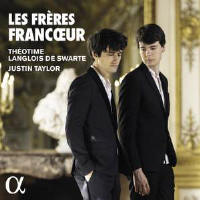Texte paru dans: / Appeared in: |
|
|
Outil de traduction |
|
|
This album charts the Francoeur family – a French musical dynasty spanning the Baroque to the early Romantic period. First, there’s Louis Francoeur, ‘Francoeur the Eldest’, here represented by two sonatas from 1725. Then there’s Louis’s brother, François Francoeur (1698-1787), known initially as ‘the Younger’, then as ‘the Uncle’ once nephew Louis-Joseph Francoeur came along in 1738. Francoeur ‘the Younger’ was a violinist at the Paris Opéra, which was where he met his collaborator François Rebel. Together they worked on Pyrame et Thisbé (1726), Les Augustales (1744), Le trophée (1745) and Le prince de Noisy (1749). We’re told in the booklet notes that it’s impossible to know which of them wrote what. A similar kind of fusion happens between the performers Théotime Langlois de Swarte and Justin Taylor here: they move as one breathing, feeling body, and it’s spellbinding.
Though they have appeared together many times in Le Consort and other ensembles, this is de Swarte and Taylor’s first outing as a duo. The first of many, I hope. Musically, they are brothers: there is such affinity in the way they explore harmony and touch, line and colour – together they conjure the sense that they are trying to spell out a language that only has beautiful words in it. In previous reviews of de Swarte, I have embarrassingly toppled into hyperbolic praise, and I run the risk once more as these performances truly are divine. Take the ‘2ème air’ from Le trophée. Taylor is caught in sumptuous rippling, richly writhing across the keyboard, all the while de Swarte pours his heart out in long, aching phrases. Or perhaps my favourite on the disc, ‘Le théâtre s’éclaire’ from Les Augustales. Taylor creates the most gorgeous of singing lines. This particular arrangement of theatre music is stunning: there is absolutely no sense that we are missing flutes or a soprano, and how the pair share the music between them is a thing of beauty. I adore the choice not to have cello or viola da gamba for the amount of glistening treble is a delight. Listen to the movement from Le prince de Noisy that closes the album – not only for the naughtiest of rising appoggiaturas but also for its intoxicating mixture of E-string luminosity and gleaming harpsichord trills.
Now after such paragraphs of praise, I feel silly to complain but I do have one issue. There’s no real meat to this album: so much of it simply explores harmony in daydreaming arpeggios. It’s like watching one of those couples in Paris so totally in love that they’re oblivious to the world around them; it’s wonderful, but also a bit much. I miss something that I can really get my metaphorical teeth into, some vigorous counterpoint where we can hear these instruments in a different sort of dialogue. The Chaconne que j’ai faitte pour donner à mon oncle by Louis-Joseph Francoeur is possibly the closest we get to this, but again it’s just so lovely – too lovely, perhaps.
|
|




